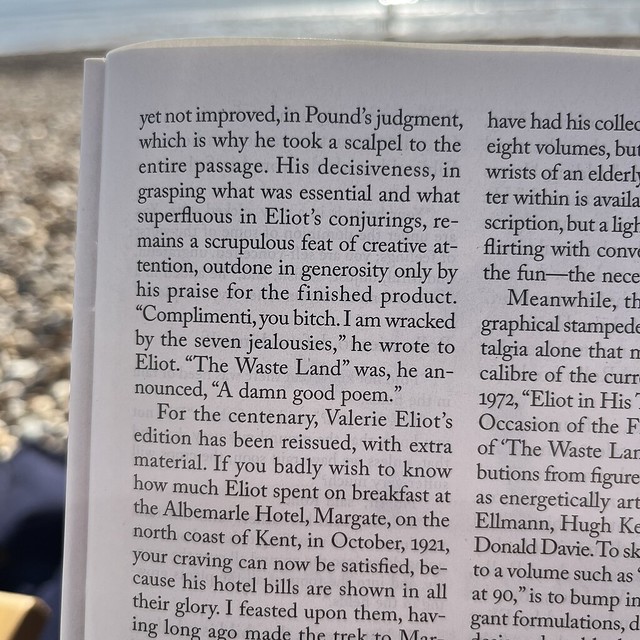That little pause before they leap into the chorus. Fantastic.
Russell Davies
As disappointed as you are
About | Feed | Archive | Findings | This blog by email
X marks a spot you've probably not heard of
As Gen X starts to become invisible, caught between boomers and everyone else, I liked this analysis from W David Marx:
"In other words, Generation "X" wasn’t simply describing a birth cohort but a broader movement in American society to redefine cultural capital from high-society manners and high art to a more inclusive, ever-curious collection of intellectual and quasi-intellectual ideas. (A classic example of Generation X values is the guy in Slacker who believes The Smurfs was meant to prepare children for "when Krishna comes about.") This Gen X focus on cultural distinction is why Fussell calls it a “parody aristocracy,” because until that point, such emphasis on bold lifestyle differences had been the exclusive privilege of the upper classes. And this focus on cultural capital also explains why the ‘90s became such a fecund cultural decade: Individuals who believe in the superiority of crate-digging — i.e. the intense search for deep cultural knowledge — end up breaking established artistic conventions rather than replicating them.
Of course, Gen Y would end up rebelling against these “aristocratic” values. There was an immediate backlash in the early 2000s against the pretensions of indie culture. Big Pop was back. As such, Millennials aren’t a “parody aristocracy” as much as a “parody bourgeoisie”: at least in the stereotype, they're striving towards high social rank through performative hard work that will inevitably lead up to unbridled entrepreneurial successes."
Also the subsequent move back to a different form of obscurantism.
October 10, 2022 | Permalink
One book library
I hate what the phrase 'one book library' suggests. But what they've actually done is lovely.
October 08, 2022 | Permalink
Nostalgia and simplicity
Sam Byers, Perfidious Albion: "In an ever-complexifying world, simplicity was a much sought-after and increasingly finite commodity, and people had a tendency to grab it where they could find it. For some, this took the form of what was effectively a culturally approved regression into infantilism. Teddy, for example, owned at least one adult colouring book, framed world events as extended riffs on Harry Potter, and had once told Hugo that constructing spaceships out of Lego helped him brainstorm. For others, it manifested as a form of nostalgia in which it was assumed that everything had been so much simpler before it all got so complicated."
Matthew d'Ancona, In It Together: "The nostalgia many felt on learning of Margaret Thatcher’s death in April 2013 was partly a yearning for clarity and definition. As if by instinct, the late Baroness framed policies and political arguments in rhetoric and metaphor that cut through to the country’s cerebral cortex, its heart and its guts. She provoked love and hate – and not much in between – precisely because everyone knew what she was up to."
October 08, 2022 | Permalink
Nostalgia is good actually
Victoria Coren, For Richer, For Poorer: "I think nostalgia is a primal emotion, like fear and anger and (maybe) love. It just seems otherwise, because it has a long name and is tricky to define out loud. So you might mistake it for one of those fiddly, sophisticated feelings like schadenfreude or low self-esteem."
October 06, 2022 | Permalink
If you're reading this, please compost me when I die
Headline shamelessly stolen from a fantastic substack post by Cass Marketos.
"Human composting works as all other composting does, although (smartly) it often happens inside specially designed facilities that are meant to accomodate the emotional experiences of the living. Bodies are prepared with biodegradable gowns. They’re laid to rest in an elegant vessel containing a mixture of alfafa, woodchips, and straw. Decomposition is allowed to happen. Some facilities will pump oxygen into the vessel to expedite decay. Others will rotate the vessel occasionally. After about two months, what remains of the body is about a cubic yard of fluffy and nutritious soil. This product is returned to the family use as they please, although some facilities offer options to donate."
Last X standing
Back at the beginning of the internet disrupting everything people used to talk about buggy whips a lot. About how once upon a time there were thousands of buggy whip manufacturers across the US and then cars, roads etc and they all suddenly went out of business.
Except, I always used to think, not all of them. I bet there are a few left. And I bet, if you can be the last one standing, you can have a very sustainable business. I always used to tell my advertising bosses that being the last great TV agency would be a fun and profitable niche (since they never seemed keen on doing the internet).
Ever since I've kept a little eye out for people who've made it through the demise of an industry and come out the other side. You know the kind of thing; record shops, typewriter repair, bookbinders, letterpress printers, minidisc makers, and now, it turns out floppy disk retailers.
These people tend to be interesting, because they're committed to something ancient and time-tested but they're also entrepreneurial and energetic. It's a good, rare, combo.
October 05, 2022 | Permalink


